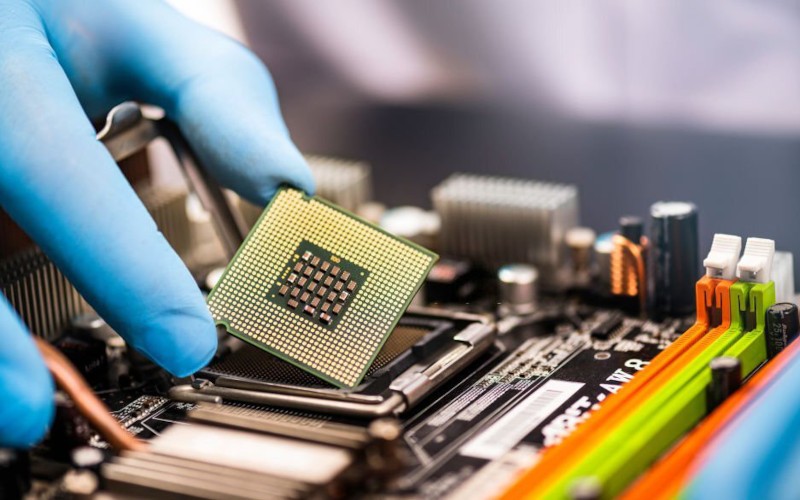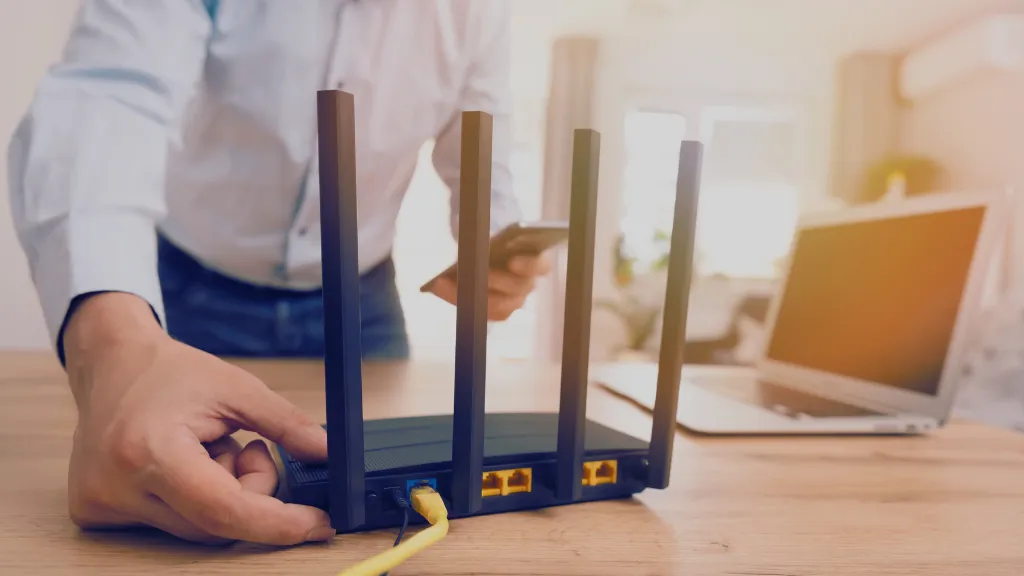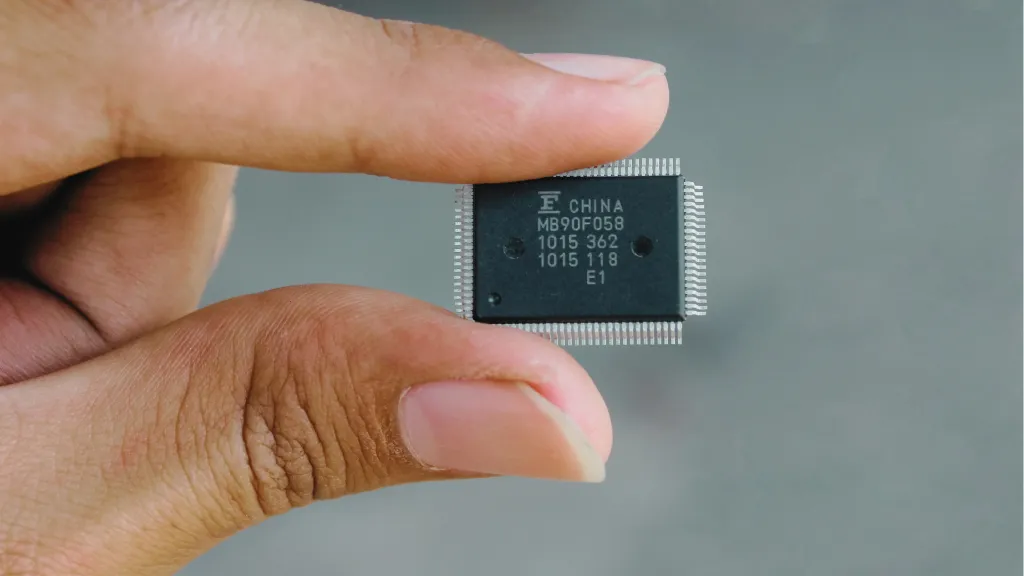Computers come in all shapes and sizes, with various functions. But, at their core, all computers have two main processors: the CPU and the GPU. What’s the difference between these two processors? And which one is more important for your computer?
Let’s take a closer look.
What is a CPU?
The CPU, or central processing unit, is the core component that defines a computing device. It is of critical importance but can only function alongside other hardware.
The silicon chip sits in a special socket on the main circuit board (motherboard or mainboard) inside the device, separate from the memory and the graphics card or chip.
CPUs are built by placing billions of microscopic transistors onto a single computer chip.
Those transistors allow it to make the necessary calculations to run programs stored in system memory. They are miniature gates that switch on or off, conveying either ones or zeros that comprise binary code.
That code comprises the low-level instructions that tell a CPU what to do.
The speed of a CPU is measured in Hertz (Hz), equivalent to cycles per second. A 1Hz CPU can execute one instruction per second, whereas a 4GHz CPU can carry 4 billion instructions per second. This number will continue to increase as technology progresses.
What Does A CPU Actually Do?
A CPU, or central processing unit, is the engine that drives a computer. Its job is to take instructions from programs and applications and perform calculations based on those instructions.
This process can be broken down into three key stages: fetching, decoding, and executing. In the fetch stage, the CPU retrieves the instruction from RAM. In the decode stage, it figures out what that instruction is.
In the execute stage, it performs the instruction using relevant parts of the CPU.
The resulting calculation can involve basic arithmetic, comparing numbers, performing a function, or moving numbers around in memory. Since numbers represent everything in a computing device, you can think of the CPU as a super-fast calculator.
The resulting workload might start Windows, display a YouTube video, or calculate compound interest in a spreadsheet.
In modern systems, the CPU acts like a ringmaster at the circus by managing all the tasks that must be performed. It does this by rapidly switching between different tasks, ensuring each gets done promptly. CPUs are incredibly powerful and efficient at doing this essential task.
What is GPU?
A graphics processing unit (GPU) is a computer processor specialized for generating image data for output to a display. GPUs are found in almost all computers, including desktop computers, laptops, and smartphones.
Most GPUs are made by one of two companies, Nvidia or AMD. GPUs are typically much faster than CPUs at processing data for graphic output. As a result, they are commonly used in video gaming and other applications where real-time graphics are required.
In recent years, the capabilities of GPUs have expanded significantly, and they are now being used for tasks such as machine learning and artificial intelligence.
What Does a GPU Do?
The need for faster and more powerful processors has only grown as the world increasingly relies on digital technology. Graphics processing units (GPUs) were originally designed to meet this need by accelerating the rendering of 3D graphics.
However, as GPUs have become more flexible and programmable, their capabilities have expanded beyond simple graphics processing. Today, programmers can use GPUs to create more sophisticated visual effects, realistic scenes with advanced lighting and shadowing techniques, and much more.
In addition, developers in fields such as high-performance computing (HPC) and deep learning are harnessing the power of GPUs to achieve unprecedented levels of speed and performance.
As GPUs evolve, even more, innovative applications will likely be developed, further enhancing our ability to process and visualize data.
What is the Difference Between CPU and GPU?
CPUs and GPUs may have much in common but are also quite different. CPUs are suited to various workloads, especially those for which latency or per-core performance is important.
GPUs, on the other hand, began as specialized ASICs developed to accelerate specific 3D rendering tasks. While graphics and the increasingly lifelike visuals of today’s games are still a major focus for GPUs, their programmability and flexibility have made them well-suited for many other compute-intensive tasks.
In many cases, the combination of CPU and GPU processing can offer the best of both worlds: the CPU handles tasks that require high per-core performance or low latency. At the same time, the GPU accelerates workloads that can benefit from its parallel processing power.
Frequently Asked Questions
Is GPU or CPU Better for Gaming?
When it comes to gaming, the GPU is the most important piece of hardware. A powerful GPU can render complex scenes and provide a smooth gaming experience. However, the CPU also plays a role in gaming performance.
A good CPU can help avoid bottlenecks and ensure the GPU has enough resources to work with. In addition, RAM and the monitor can also impact gaming performance. A higher-resolution monitor will require more resources from the GPU, and more RAM will be needed to store game data.
Ultimately, considering all these factors, the best gaming experience comes from having a balanced configuration.
Do I Need A Good CPU If I Have A Good GPU?
There is a lot of debate over whether having a good CPU or GPU is more important. Both are important components of a computer, but they serve different purposes. The CPU is responsible for processing data, while the GPU is responsible for rendering images.
So, which one should you upgrade to improve your computer’s performance?
If you’re an active gamer or video editor, upgrading your GPU is generally advisable.
This is because games and videos are very graphics-intensive, so that a good GPU can handle them much better than a good CPU. Additionally, it’s probably time for an upgrade if you’ve had your current GPU for over four years.
On the other hand, upgrading your CPU may be a better option if you’re not concerned with graphics performance. This is because the CPU controls every aspect of the system besides graphics. Upgrading the CPU first’s generally more cost-effective, as it will last longer and provide better performance overall.
Ultimately, there is no right or wrong answer when deciding whether to upgrade your CPU or GPU first. It depends on your individual needs and preferences. However, upgrading both components is generally the best option if you’re looking to improve your computer’s overall performance.
How Long Do GPUs Last?
A GPU can last 5 to 8 years, depending on how frequently it is used and how well it is taken care of. If a GPU is only used Occasionally and well-maintained, it can last even longer. In terms of performance, a good mid-level GPU today would likely only serve at a mid-to-high performance level for 3 years or so.
Beyond that, the performance degradation will likely be noticeable enough for most users to want to upgrade to a newer model. However, many older GPUs still function adequately for basic tasks such as web browsing and document editing.
Does GPU Increase FPS?
The Graphics Processing Unit (GPU) is the most important component in determining gaming performance for most gamers. A higher-end GPU will always offer better frame rates than a lower-end card, but the difference may not be as dramatic as some might expect.
In many cases, upgrading from an older GPU to a newer model will result in only a marginal increase in FPS. This is because the CPU is often the bottleneck in gaming performance. As such, upgrading to a newer and faster CPU will often impact FPS more than upgrading the GPU.
That being said, some games rely more on the GPU than others. Games that heavily use graphics effects such as water reflections and shadows will typically see a larger boost in FPS from a new GPU. So, to upgrade your gaming rig, look at the CPU rather than the GPU.
Conclusion
CPUs and GPUs are two important types of processors for computers. CPUs are general-purpose processors that are good at various tasks, while GPUs are specialized processors that excel at certain calculations.
In many cases, combining both types of processors can offer the best performance.






